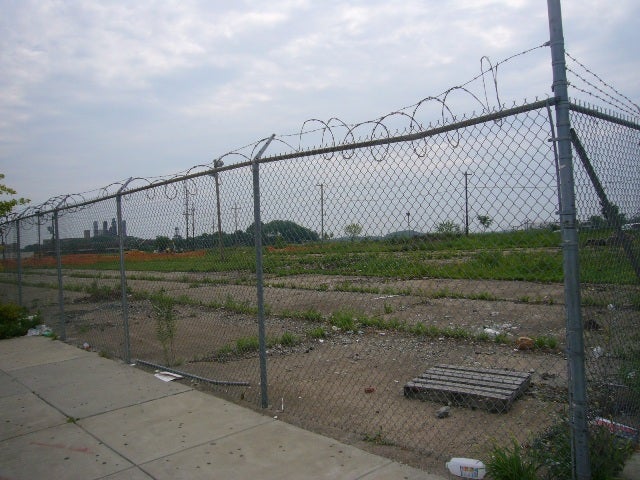What’s next in Foxwoods saga?

Jan. 20, 2010
By Kellie Patrick Gates and Thomas J. Walsh
For PlanPhilly
Judgment Day approaches for Foxwoods.
The Pennsylvania Gaming Control Board could make a decision about the proposed casino’s fate as soon as next week, and its own enforcement arm says the board would be justified in yanking Philadelphia Entertainment and Development Partners’ gaming license.
If that happens, the second Category 2 license issued in Philadelphia would be up for grabs and a whole new application process would begin.
Many Philadelphians – from elected officials to community activists – say if another licensee is chosen, local residents and leaders should have a bigger role in that process – including site selection.
“I would hope the city is engaged in thinking through the siting,” said Planning Commission Executive Director Alan Greenberger, who is also Philadelphia’s acting deputy mayor for planning and commerce.
Brian Abernathy, policy chief for First District Councilman Frank DiCicco, in whose district SugarHouse and Foxwoods sit, goes a little further, saying the board should “give the city the opportunity to choose the location, rather than the developer choosing the location.”
We’re doing OK
Foxwoods officials say hold on a minute. They plan to keep their license – and make the most of it.
“The investors expect that this is going to be a top-notch casino,” said Foxwoods attorney Fred Jacoby. “And I want to thank the city, and the citizens of the city for their patience and cooperation.”
Just how much patience the Gaming Control Board has left is central to whether Foxwoods stays or goes.
The decision the board faces as soon as its next meeting, Wed., Jan. 27, is whether to give the casino investors more time to produce site plans for a proposed location at Delaware Ave. and Reed St. in South Philadelphia. Foxwoods could not make a Dec. 1 deadline on that matter and has asked to be given until March 1, when financing documents are also due.
Foxwoods is the only major casino project – there are 11 licensed in Pennsylvania – that is not open or under construction.
State Rep. Michael O’Brien, who has always opposed Foxwoods’ waterfront location, said all the time Foxwoods’ is taking to open is costing the state money – the loss of casino revenue.
The fact that slots machines aren’t yet whirring at Delaware and Reed is not for lack of effort, said PEDP attorney Jacoby. “I know that some people are cynical about some things that happened in the past. It wouldn’t be productive for me to comment on that,” he said.
A bit of history
Let’s recap: Foxwoods has faced heaps of community opposition and a plethora of State Supreme Court lawsuits – all the legal decisions went the casino’s way. That part of the story also holds true for SugarHouse, which is now under construction on Fishtown’s waterfront.
https://www.youtube.com/watch?v=wevSjyNkgtc
But Foxwoods also took a detour that SugarHouse did not. At the urging of Mayor Michael Nutter and other local and state officials, Foxwoods spent several months considering two different Market Street locations. The casino was trying to work out a real estate issue at the old Strawbridge & Clothier location when the PGCB granted its two-year license extension, and made it clear in the decision that Foxwoods needed to build in South Philadelphia and with a design quite similar to the one the Gaming Control Board had approved in 2006.
Foxwoods’ license extension means it now has until May 2011 to get its slot machines up and running, provided it meets certain conditions. The Dec. 1 deadline for submitting site plans was one of them.
Foxwoods’ attorneys said Philadelphia Entertainment and Development Partners needed more time because the state legislature had not yet decided whether table games would be legalized (they since have been), and because the type and source of the funding would have an impact on design.
State Sen. Larry Farnese, O’Brien and others filed a response saying the request should be denied. And the Chief Council from the PGCB’s Bureau of Investigations and Enforcement said that the board is authorized, at this point, to revoke the license or fine Foxwoods.
Jacoby said that PEDP disagrees with the BIE assessment. Formal responses have been filed.
Jacoby says success is imminent. The investors are close to reaching a deal with a new investor, and everything will fall into place after that. Another Foxwoods attorney, Stephen Cozen, has said this new majority investor is well known in the casino business. Jacoby said the plan is to announce the new partner’s identity by the end of this month.
Process issues
Foxwoods can’t officially have a new partner, however, without the approval of the Gaming Control Board. Board spokesman Doug Harbach said approval would only happen after a public process and a thorough review of the new partner. “If there are new principals, new corporate entities brought in, a thorough investigation would be done,” he said. He does not yet know what that would entail, although it likely would mean a local hearing.
Mary Isaacson – O’Brien’s chief of staff – said a new investor would have to be “vetted as a new applicant and go through the entire licensing process to see if they were approved.” And the big question, said Isaacson, is if this happens, shouldn’t the entire licensing process be opened up to other potential casino operators again? “I’m sure someone will ask,” she said, likely in the form of a lawsuit.
Isaacson said that one of the reasons the board chose the Foxwoods’ team was because of the casino experience held by the Mashantucket Pequot tribe. The tribe runs Foxwoods Casino in Connecticut, but they have experienced serious financial trouble recently.
Harbach said a new principal investor would not result in re-opening the license to other applicants. Adding someone to an existing license holding team doesn’t require it, he said.
Foxwoods attorney Jacoby said there is no current plan for the tribe to discontinue working with the casino team. “At the present time, that’s not the contemplation,” he said. “There is no reason to believe everybody who is now a partner wouldn’t continue to be a partner after we add a new investor.”
When The Rivers Casino in Pittsburgh wanted to add Neil Bluhm as an investor, the PGCB held hearings and approved Bluhm – who is principal investor of SugarHouse – without reopening the license.
Jacoby said he didn’t think it was appropriate to compare the Foxwoods situation to The Rivers’ set up – he is certain there are differences, although he wouldn’t go into them. Whatever concerns the gaming board has about the new investor, the Foxwoods team will address them, he said.
As of Monday, Foxwoods does not have the site plan documents ready, Jacoby said. And while the legislature has ended the table games mystery – something he has said Foxwoods’ potential investors wanted to know before committing – the financial details, due to the state on March 1, have not yet been finalized.
“Obviously, as soon as we reach an arrangement with (the new) investor, we want to sit down and talk through” the site plans, he said.
Harbach said the board is now determining whether it can be ready for the site plan extension hearing by next week. If not, the board’s next meeting is Feb. 11, and it could also call a special session.
“I hope and expect the board will approve our request,” Jacoby said. If it does, he expects both the financial and site plans will be ready by March 1.
The new state gaming law that legalized table games also says casinos can apply for another two-year extension to open their doors. Foxwoods is not named, but it is the only casino at this time to which the language would apply.
Some observers wonder if the legislators’ seeming willingness to wait longer for Foxwoods will take the pressure off the Gaming Control Board, and allow them to grant the site plan extension request.
Harbach said the two issues are not related. “The legislation that was passed really does not change anything regarding Foxwoods at this juncture,” he said. “Per the language in the bill, the board could grant an extension, but only if good cause is shown, so there is not an automatic extension that is granted simply through passage of the legislation.”
Jacoby said he could not predict if the board would be influenced by the potential for another extension that would give Foxwoods until Dec. 2012 to have the casino up and running. “Certainly the investors were pleased by this provision in the act for additional time, but I don’t think one has to do with the other,” he said.
If Foxwoods were granted such an extension, it could open with a full-fledged, permanent casino instead of a temporary or interim one, he said.
Jacoby said the Foxwoods team remains very confident that their project will be a huge success.
So if Foxwoods gets tripped up, where should a new casino go?
Greenberger said that Foxwoods’ fate is up to the Gaming Control Board; and for now, the city continues to operate on the assumption that Foxwoods will open in Philadelphia.
His staff doesn’t spend as much time on Foxwoods as it once did, however. Letters have been sent telling the Foxwoods team that the city is ready to talk whenever they are. “We meet about casinos regularly,” he said. But most of the weekly discussion is about SugarHouse’s progress. When it comes to Foxwoods, “I ask, ‘Has anybody heard anything?’ It’s always short. There’s nothing to talk about.’”
If Foxwoods loses its license and the process starts again, Greenberger wants his team to have a say in where the city’s second casino should be built. But he has no particular sites in mind right now, he said. “It would be idle speculation against so many unknowns,” he said.
Others have opinions, however.
Both O’Brien and Natalia Olson-Urtecho, the H2L2 urban planner who sits on the city’s Zoning Code and Planning commissions, like the PhillyLive! site.
“I’m the biggest fan of that – I think it makes more sense,” Olson-Urtecho said, echoing comments she made during a Planning Commission meeting last year about placing a casino within the Philly Live! development. “Making it right there at the stadiums would be the best. You’re not bothering any other communities, because it’s already a destination. If you can create [another] hotel there, it would also be close to the Navy Yard and the airport. It’s great to have all those options.”
That site could run into trouble with state gambling law, however, which mandates that casinos must be at least 10 miles from one another (an exception was made for Foxwoods and SugarHouse). Harrah’s Chester is – just barely – within 10 miles of the stadium complex, Greenberger said, meaning “as the crow flies.” Google Maps puts the formal street addresses for Harrah’s Chester and the Wachovia Center as separated by 10.1 miles by car. Mapquest puts the distance between 777 Harrah’s Blvd. in Chester and 3601 S. Broad Street at 12.16 miles.
But O’Brien said at least parts of the development are outside the 10-mile radius. A handful of city officials, speaking mostly off the record, said it would be a shame if Philly Live! were ruled out, given the caliber of the developers: Comcast-Spectacor, the city’s highest profile company, and the Cordish Cos. of Baltimore. With those kinds of backers, financing a gaming hall and getting necessary state approvals would presumably present no problems. Already, plans for Philly Live! include a 300-room hotel.
Also, Cordish has a full-scale gaming and lodging division within its company, and recently developed a $500 million “Indiana Live!” casino near Indianapolis. It has built two Hard Rock casino-hotels in Florida – the first casino Hard Rocks outside of Las Vegas.
The company is developing a $750 million tribal casino-hotel for Sullivan County in New York State, and Cordish says it has development agreements with “several other major hotel and casino resorts in the United States and internationally.” David Cordish, the firm’s president, told newspapers in December that plans were on pace for a $300 million gaming parlor with 4,750 slot machines to open in the fall of 2011, at the Arundel Mills Mall in Hanover, Md., near Baltimore.
A spokesman for Comcast-Spectacor deferred comments to Cordish. Phone calls and email to David Cordish, and to Gary Block, vice president in charge of Philly Live! for Cordish, were not returned.
Even if Philly Live! is outside the 10-mile barrier, “I would be extremely surprised that that was an option that was looked at seriously,” said Craig Schelter, the former PIDC senior executive and planning chief who now represents a group of Philadelphia developers. “The fundamental issue there would be parking and the size of events. That issue was hugely argued when plans were originally done. There’s a maximum number of people who can be down there at any given time.”
Schelter said that the combination of schedules for the Eagles, Phillies, 76ers and Flyers are “enormously complex,” and that’s before allowing for other large annual events, such as concerts, truck shows, the circus and non-professional sports. That means there surely “would be a fight with the South Philly neighborhoods,” Schelter said. Assuming the Philly Live! development comes to fruition at all, adding a casino would be pushing it, he said.
Besides, he added, there might already be a preferred alternate (or additional) site – the old Cramp Shipyard, a 46-acre riverfront site between E. Cumberland and Dyott streets just off Delaware Avenue. The parcel is less than a mile north of SugarHouse, but consistent with the vagaries of the Commonwealth’s gaming laws, the 10-mile rule does not apply to casinos competing with each other within the city of Philadelphia.
“That was always the city’s favorite site” for a casino in the past, said Schelter, who represents Jim Anderson, the owner of the site. The land in the Cramp area – foreign to most city residents – is typical of many former industrial sites along the Delaware, featuring several abandoned finger piers, now overgrown with weeds and bushes.
O’Brien likes that site, too. He calls it by its other name, the Pinnacle site. “It is insulated enough” from neighborhoods, he said. One problem he now has with it, though, is concern that it is too close to the SugarHouse site. The state has no distance rules regarding casinos within Philadelphia, but he does not want to create a “casino district.” This piece of land is now for sale. http://planphilly.com/node/9083
O’Brien also likes a site immediately north of theTacony-Palmyra bridge. “It’s insulated from communities, and I believe it is outside of 10 miles from Philly Park,” which is now called Parx.
Northern Liberties Neighbors Association President Matt Ruben thinks the state should eliminate the 10-mile buffer rule. “Casinos are so auto-driven,” he said. “I don’t see how it really matters if it’s 10 miles or 8.2 miles,” he said.
Eliminating that rule would open up more possibilities in the Navy Yard area, he said. Only a small part of it is outside of ten miles now, he said. Ruben said the first priority in a Navy Yard casino location would be ensuring the health and vitality of the port, but there would still be room there for a casino.
Mistrust remains
Whatever process the Gaming Control Board might choose to reissue a license, they are going to face a struggle to earn the trust of many Philadelphia residents.
”The Pennsylvania Gaming Control Board still has virtually no credibility in the eyes of the general public,” Ruben said.
“I think the city and state legislators who supported the rights of communities to have a say should convene their own blue ribbon process. A panel of experts should survey the area and come up with a report to recommend some locations,” he said.
Ruben said he would also like to see the board articulate a clear timeline for any process they create, with public hearings held every step of the way. And they must also commit to providing the applicants’ complete information to the public before the hearings.
“In the past, the public was forced to comment without having full information” about the applicants and their proposals, Ruben said. “It was farcical.”
Casino-Free Philadelphia has previously outlined the way they think a casino site should be selected.
It’s important that any process for selecting a new licensee is public one – that actually gives the public some power, said Casino-Free attorney Paul Boni. “If there are no standards, if there is no ability to test the information, if there is no way to appeal, it’s just a show,” he said.
Contact the reporters at kelliespatrick@gmail.com or thomaswalsh1@gmail.com.
WHYY is your source for fact-based, in-depth journalism and information. As a nonprofit organization, we rely on financial support from readers like you. Please give today.





